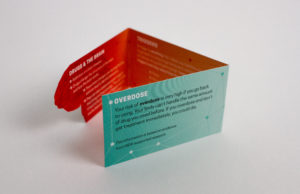overdose for those involved in the criminal justice system: “[The] study showed a 12-fold increase in the risk of death among former inmates during the first two weeks after release,” she said. “There are several possible reasons for this, including untreated substance problems. Treatment during incarceration can reduce the likelihood of relapse and overdose, however, it is critical that individuals with substance use problems connect to treatment in their community.”
The DBWC can be most useful when used in combination with addiction treatment, she said. There are various effective medications to treat substance use disorders such as methadone, buprenorphine and naltrexone, which can assist in treatment for those struggling with an opioid addiction.

Although the DBWC has not been tested in clinical or case studies, Wiley said, the card is meant to be applied in a diverse variety of settings and has been a very popular resource. The tool has increased in demand every month since NIDA released it in December. So far, more than 90,000 cards have been distributed.
“Staying drug-free is more difficult outside of controlled environments,” Wiley said. “It’s important to understand that addiction is a complex brain disease.”
The card can be ordered free of charge from the NIDA Research Dissemination Center here.















